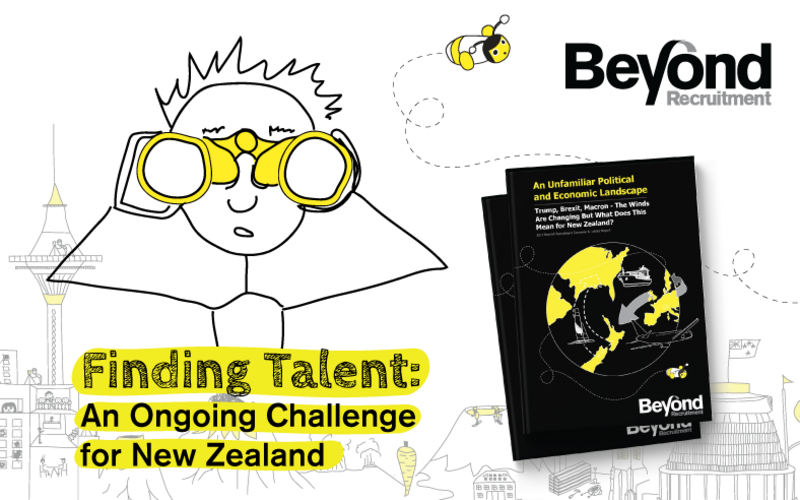We recently released our 2017 Beyond Recruitment Economic & Labour Report. As part of the report this year, we surveyed New Zealand business leaders, adding real life context to an already intriguing economic landscape. This survey produced some interesting results, giving a great insight into the priorities of business leaders, and the problems faced by employers throughout the country.
Access to Talent a Key Issue
The key issue that emerged from this was the availability of talent. 48% of respondents stated that a lack of available talent is the biggest barrier to the ongoing success of their business. To put that into perspective, digital disruption was the next most cited barrier (17% of respondents). Further responses to our survey only reinforce this point:
- 83% of respondents stated that it is difficult to recruit talent for their business needs
- 50% state that it is harder to find good talent now, compared to three years ago
- 56% stated that they were not satisfied with the quality and suitability of talent entering the marketplace locally
New Zealand businesses are facing a significant problem when it comes to accessing talent that is going to help their business. While attracting top talent has always been difficult, responses indicate that is harder now than ever before; with the demands of digital disruption, a changing talent market, and shifting candidate expectations, all sharing a portion of the blame.
Businesses Reluctant to Embrace Alternatives
While businesses are specifically concerned with sourcing local talent, there is also concern over how well they will be able to plug this gap with workers entering New Zealand from overseas. Changes to New Zealand skilled migrant policy have polarised, and confused, employers, with 23% of respondents saying that the changes were not going to work for their business, and 39% saying they were unsure about the impact of the changes.
A growing contingent workforce also isn’t seen as a solution by employers, with 71% of employers showing a significant preference for permanent employees, and 74% saying that they would not take advantage of the increasing availability of remote workers. These results make it quite clear: New Zealand employers want the talent they need, locally sourced and available on a permanent basis.
In today’s candidate driven market, and with local talent stocks only continuing to tighten, employers may no longer have a choice when it comes to utilising contingent or remote workers. With technology advancing rapidly and uptake increasing across the board regardless, this isn’t the death knell it might be made out to be. The number of non-permanent workers has increased and with flexibility coming to the fore as a priority for candidates, this number is likely to grow.
Summary
In short, New Zealand businesses are struggling to engage the talent they need. While great talent has always been in high demand, and some companies will always find it harder than others, the current state of the market poses several obstacles to businesses. While there are alternatives to the traditional means of engaging talent, many business leaders aren’t enthused by the options available to them. If they want to continue to attract the people who are going to make a difference to their business, they may have to make concessions or provide other benefits to their workers.
For more insights into the current economic and labour market, download the 2017 Beyond Recruitment Economic & Labour Report today.





